
Biden on Afghanistan: ‘I will not repeat the mistakes we’ve made in the past’

Biden defends decision to withdraw from Afghanistan: “How many more lives, American lives, is it worth?”
President Biden stood firm in his decision to withdraw US troops from Afghanistan, vowing in White House remarks to not repeat the mistakes “we’ve made in the past.”
“So I’m left again to ask of those who argue that we should stay. How many more generations of America’s daughters and sons would you have me send to fight Afghanistan’s civil war? When Afghan troops will not? How many more lives, American lives, is it worth? How many endless rows of headstones at Arlington National Cemetery? I’m clear in my answer. I will not repeat the mistakes we’ve made in the past,” the President said.
“The mistake of staying and fighting indefinitely in a conflict that is not in the national interest of the United States, of doubling down on a civil war in a foreign country, of attempting to remake a country through the endless military deployments of US forces. Those are the mistakes we cannot continue to repeat because we have significant vital interest in the world that we cannot afford to ignore,” the President continued.
Biden acknowledged how painful it is for many in the US and in Afghanistan to see the images unfolding on the ground.
“The scenes that we’re seeing in Afghanistan, they’re gut-wrenching, particularly for our veterans, our diplomats, humanitarian workers, for anyone who has spent time on the ground working to support the Afghan people,” Biden said.
“For those who have lost loved ones in Afghanistan, and for Americans who have fought and served in the country, serve our country in Afghanistan. This is deeply, deeply personal. It is for me as well. I’ve worked on these issues as long as anyone,” Biden continued.
Biden touted his own travel to the region as vice president, telling reporters, “So now we’re focused, focused on what is possible.”
“We will continue to support the Afghan people. We will lead with our diplomacy, our international influence and our humanitarian aid, we’ll continue to push for regional diplomacy and engagement to prevent violence and instability. We’ll continue to speak out for the basic rights of the Afghan people, of women and girls, just as we speak out all over the world. I’ve been clear: human rights must be the center of our foreign policy, not the periphery. But the way to do it is not through endless military deployments,” the President said.
CNN’s DJ Judd contributed reporting to this post.
Biden: “It is wrong to order American troops to step up when Afghanistan’s own armed forces would not”
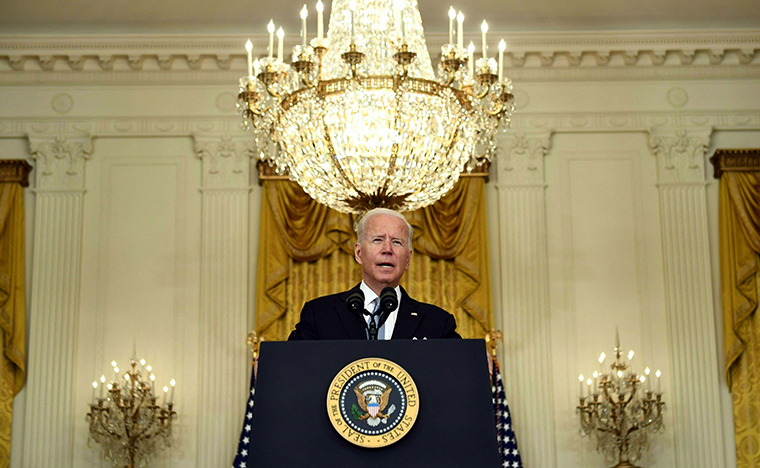
President Biden said the situation in Afghanistan unfolded “more quickly than we had anticipated,” but defended his withdrawal of US troops.
“American troops cannot and should not be fighting in a war and dying in a war that Afghan forces are not willing to fight for themselves,” Biden said in an address to the nation Monday.
“We spent over a trillion dollars. We trained an Afghan military force of some 300,000 strong, incredibly well equipped. A force larger in size than the militaries of many of our nato allies. We gave them every tool they could need. We paid their salaries, provided for the maintenance of their air force, something the Taliban doesn’t have,” he continued.
Biden said it was the Afghanistan political leaders who gave up and fled the country.
“We gave them every chance to determine their own future. We could not provide them the will to fight for that future. There are some very brave and capable Afghan special forces units and soldiers, but if Afghanistan is unable to mount any real resistance to the Taliban now, there is no chance that one more year, five more years or 20 more years of US military boots on the ground would’ve made any difference.”
The President said he believes “it is wrong to order American troops to step up when Afghanistan’s own armed forces would not.”
Biden: My choice was either to follow through with Trump’s agreement with Taliban or escalate conflict
From CNN’s Maureen Chowdhury
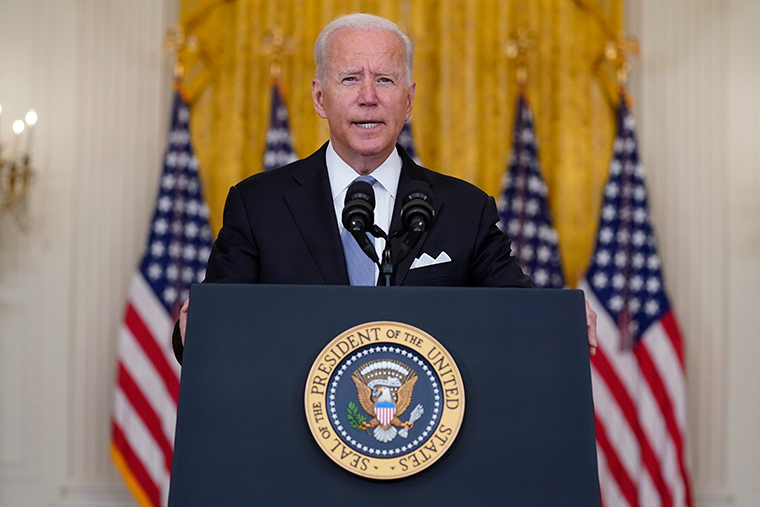
President Biden defended his decision to rapidly withdraw troops from Afghanistan, citing the deal his predecessor, former President Donald Trump, made with the Taliban as one of the main reasons.
“When I came into office, I inherited a deal that President Trump negotiated with the Taliban. Under his agreement, US Forces would be out of Afghanistan by May 1, 2021, just a little over three months after I took office. US forces had already drawn down during the Trump administration from roughly 15,500 American forces to 2,500 troops in country. And the Taliban was at its strongest militarily since 2001. The choice I had to make as your President was either to follow through on that agreement or be prepared to go back to fighting the Taliban in the middle of the spring fighting season. It would’ve been no ceasefire after May 1. There was no agreement protecting our forces after May 1. There was no status quo of stability without American casualties after May 1,” Biden said during his remarks from The White House.
Biden continued, “There was only a cold reality of either following through on the agreement to withdraw our forces or escalating the conflict and sending thousands more American troops back into combat in Afghanistan. Lurching into the third decade of conflict. I stand squarely behind my decision,” Biden said.
Biden: US mission in Afghanistan “was never supposed to have been nation building”
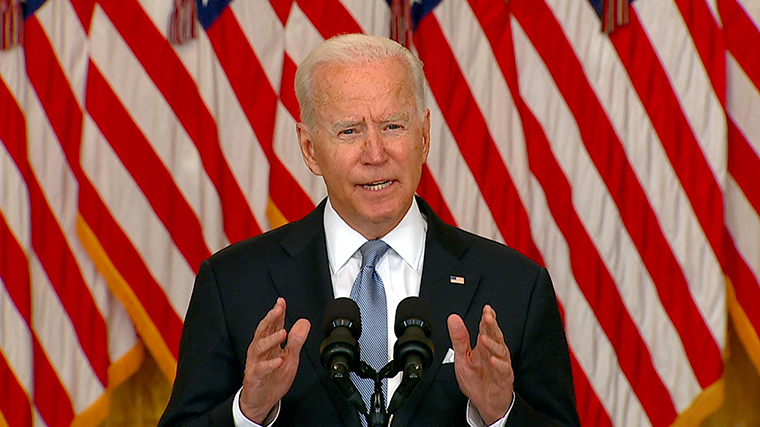
President Biden began his address to the nation Monday by saying that the situation in Afghanistan is “rapidly evolving.” He said the White House’s national security team is “closely monitoring the situation on the ground.”
Biden said he wants to remind the country “how we got here and what America’s interests are in Afghanistan.” He said that the US mission in Afghanistan that started two decades ago “was never supposed to have been nation building.”
“I went to Afghanistan almost 20 years ago with clear goals: get those who attacked us on Sept. 11, 2001, and make sure al Qaeda could not use Afghanistan as a base from which to attack us again. We did that. We severely degraded al Qaeda and Afghanistan. We never gave up the hunt for Osama bin laden and we got him. That was a decade ago. Our mission in Afghanistan was never supposed to have been nation building,” he said.
He added: “Our only vital national interest in Afghanistan remains today what has always been, preventing a terrorist attack on American homeland.”
Biden’s address is ongoing.
NOW: Biden delivers remarks on Afghanistan and America’s longest war
From CNN’s Kevin Liptak, Jeff Zeleny, Kaitlan Collins and Jennifer Hansler
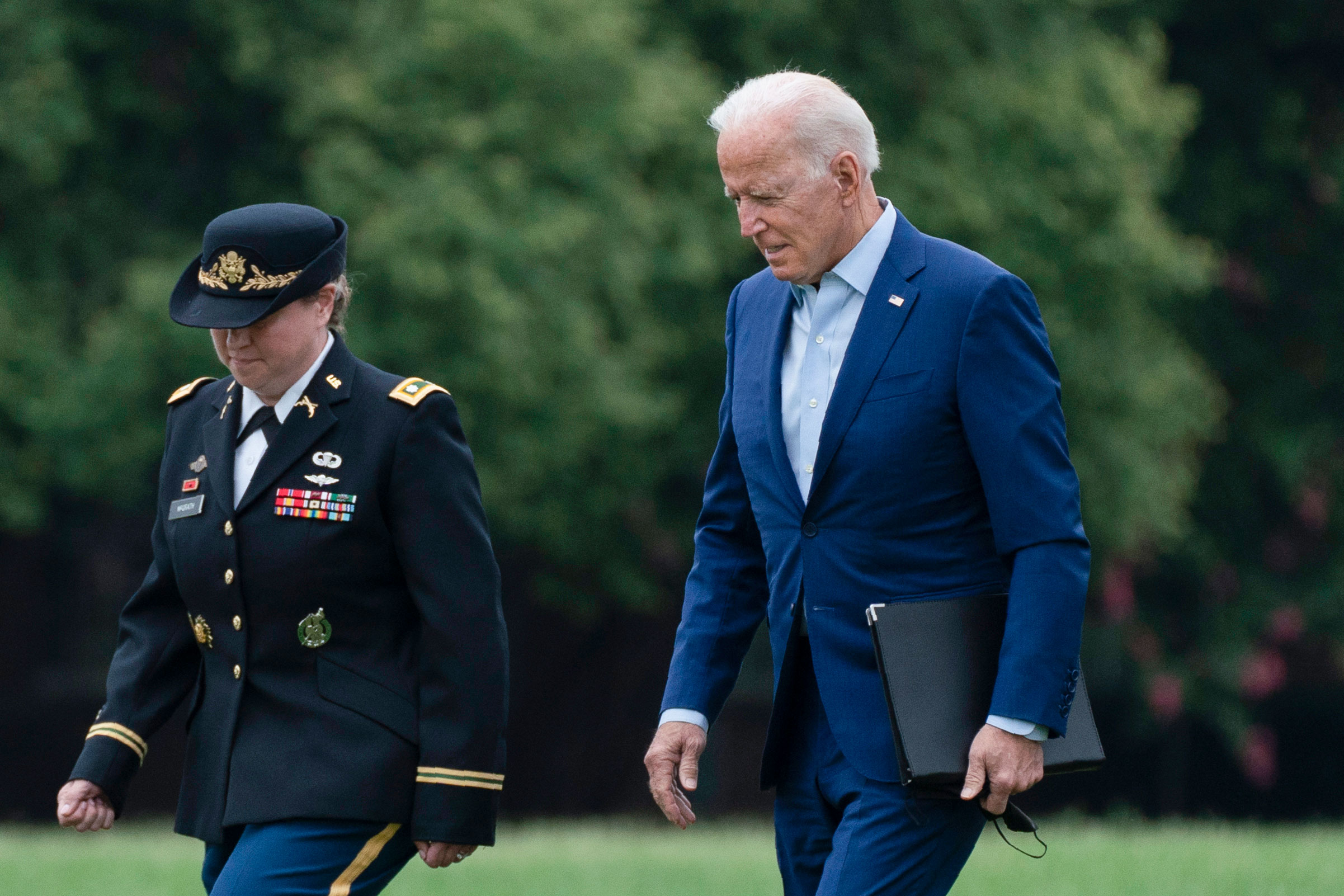
President Biden is addressing the crisis in Afghanistan from the White House as he faces mounting questions about his administration’s apparent failure to prepare for the collapse of that nation’s government.
Biden remained at the Camp David presidential retreat with members of his family over the weekend as chaotic images from Kabul emerged. He returned to Washington today ahead of his address.
It will be his first time in six days speaking in public on the matter, which has become the most serious test of Biden’s foreign policy since he took office.
Even as chaos descended on Kabul’s international airport, where desperate Afghans rushed the tarmac seeking a way out of their country, the President has remained resolute in his decision to withdraw American troops from the country.
At the same time, he has sent an additional 6,000 troops to the country to secure the airport, a sign of the complicated and contradictory process of winding down America’s longest war.
In a written statement over the weekend, Biden staunchly defended his decision to leave Afghanistan, saying he would not pass the 20-year conflict on to another president. He also lay part of the blame for the current situation on his predecessor, Donald Trump, who brokered a deal with the Taliban to withdraw American troops by May 1, 2021.
Speaking Monday on morning television programs, senior members of Biden’s national security team also sought to shift blame for the collapse of the Afghan government on the country’s defense forces, which they said lacked the will to defend their country against the Taliban.
Read more about Biden’s remarks here.
White House circulates talking points pushing back on criticism of Afghanistan withdrawal
From CNN’s Lauren Fox and Jeremy Herb
As a sign of the increasing blowback the Biden administration is facing on Afghanistan, the White House has circulated a series of talking points that have been distributed to Democratic offices this afternoon ahead of President Biden’s speech.
Some Democratic lawmakers have become more outspoken in recent days against the approach that Biden took in the withdrawal.
The talking points contain some factual errors and are missing important context. For example, there are around 900 troops still in Syria, despite the talking points claiming there are no “boots on the ground” in the country.
And the White House claims that troops had been prepositioned in the region in a sign they anticipated that Kabul could fall quickly, but not all of the troops were prepositioned. The 82nd Airborne deployed from Fort Bragg, North Carolina.
The White House also pushed back on the criticism it did not do enough to evacuate Afghanistan civilians sooner, claiming that “many Afghans to whom we gave visas to come to the US chose to stay in their country, still hopeful.” But there is clear evidence some of these eligible Afghans have been trying to leave the country for weeks, and, moreover, some have been waiting years for visas. Bipartisan lawmakers and advocates have been telling the administration for months that the process was moving too slowly.
CNN’s Jeremy Diamond, Jennifer Hansler and Natasha Bertrand contributed reporting to this post.
Germany’s Merkel calls Taliban Afghanistan takeover “bitter, dramatic and terrible”
From CNN’s Claudia Otto and Hannah Ritchie
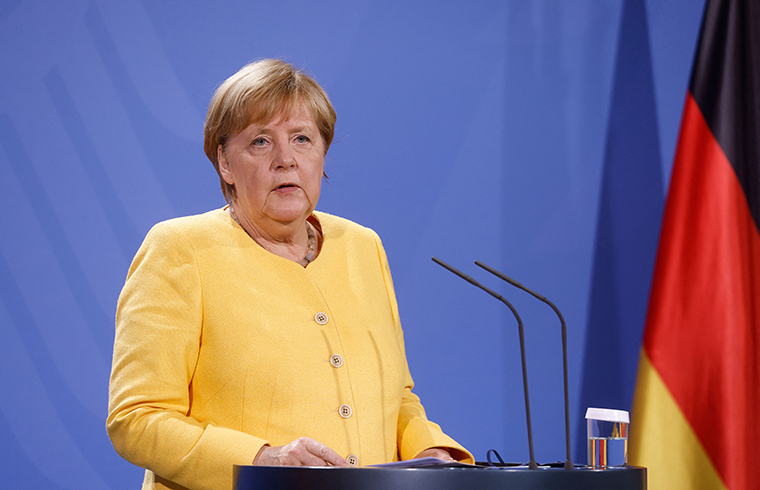
German Chancellor Angela Merkel has described the Taliban’s takeover of Afghanistan as “bitter, dramatic and terrible,” calling on the international community to increase aid to Afghanistan’s neighboring countries to prevent Afghan asylum seekers from traveling onwards to Europe.”
“This is a particularly bitter development. Bitter, dramatic and terrible…it is terrible for the millions of Afghans who have worked for the freedom of a society,” Merkel said during a televised news conference on Monday.
“We need to make sure that the many people who have big worries and concerns…have a secure stay in countries neighboring Afghanistan…we should not repeat the mistakes of the past when we did not give enough funds to UNHCR and other aid programs, and people left Jordan and Lebanon toward Europe,” she added.
Earlier this month, the US State Department announced new parameters to its Refugee Admissions Program, requiring Afghan citizens to first reach a third country before they are able to apply for asylum in the US.
Turkey later criticized the US program, warning that the decision would “cause a major refugee crisis” in the Mediterranean.
On Monday, hundreds of people were seen pouring onto the tarmac at Kabul’s Hamid Karzai international airport, desperately seeking a route out of the country.
While some evacuation flights have been able to take off, commercial flights have been suspended, making it virtually impossible for Afghan citizens to leave the country.
According to German Foreign Minister Heiko Maas, 1,900 of Germany’s 2,500 local workforce in Afghanistan have been evacuated so far.
Addressing the ongoing evacuation efforts, Merkel told reporters that a “Bundeswehr aircraft is on approach to Kabul but can’t land because of the chaotic situation on the ground.”
French president: Afghanistan must not become a “haven for terrorists again”
From CNN’s Saskya Vandoorne
Afghanistan must not become a “haven for terrorists again” French president Emmanuel Macron said in a televised national address Monday.
“It is a challenge for international stability and peace and we will do everything with Russia, the United States and Europe to cooperate efficiently as our interests are the same,” Macron said.
Speaking from the Fort de Brégançon the summer residence of French presidents, Macron said it was France’s duty to “protect those who helped us: interpreters, drivers, cooks and so many others.”
In an address that lasted just over ten minutes, Macron said the destabilization of Afghanistan could lead to migrant flows to Europe.
“We will therefore set up an initiative, with Germany and other European countries, to build a robust, coordinated and united response without delay, which will involve the fight against irregular flows,” he said.
Macron said the fight in Afghanistan was “just” and that “it is the honor of France to have committed ourselves to that fight. France has only ever had one enemy there: terrorism.”
A look back at Operation Enduring Freedom, the US mission in Afghanistan
The Taliban has swiftly regained control of Afghanistan 20 years after US forces began Operation Enduring Freedom (OEF).
The United States linked the September 11, 2001 terrorist attacks to al Qaeda, a group that operated under the Taliban regime’s protection in Afghanistan. The operation was launched to stop the Taliban from providing a safe haven to al Qaeda and to stop al Qaeda’s use of Afghanistan as a base of operations for terrorist activities.
Operation Enduring Freedom began on October 7, 2001, under President George W. Bush’s administration, with allied air strikes on Taliban and al Qaeda targets.
On Oct. 14, 2001, the Taliban offered to discuss giving Osama bin Laden, then the lead of al Qaeda, to a third country for trial if the United States provided evidence of bin Laden’s involvement in the Sept. 11 attacks. The White House rejected the offer.
On Nov. 13, 2001, US airstrikes and ground attacks by the anti-Taliban Afghan Northern Alliance led to the fall of Kabul.
That same month many European countries offered troops to support OEF including, Germany, the Netherlands, France and Italy. US Defense Secretary Donald Rumsfeld also announced that the US doubled the number of its troops based in the country.
Over the next 20 years, the US along with allied nations and coalitions worked to create a stable Afghan led nation and also create and train an Afghan national army. Here’s a timeline:
Dec. 2-5, 2001 – The United Nations hosts the Bonn Conference in Germany, results from the Bonn Agreement creates an Afghan Interim Authority and outlines a process for creating a new constitution and choosing a new government.
Dec. 20, 2001 – The United Nations authorized the International Security Assistance Force (ISAF) to provide security support to the Afghans. The United Kingdom agrees to lead the force initially.
Dec. 22, 2001 – Hamid Karzai is sworn in as head of an interim power-sharing government.
March 25, 2002 – Rumsfeld announces that there are plans under way for US and coalition forces to help train and create an Afghan national army.
January 2004 – Afghanistan passes a new constitution by consensus.
Oct. 9, 2004 – Afghanistan’s first direct democratic election is held.
Dec. 7, 2004 – Karzai is sworn in as the first democratically elected president of Afghanistan.
Dec. 1, 2009 – Obama announces the deployment of 30,000 additional US troops. This new deployment, set for 2010, brought US troop totals to almost 100,000, in addition to 40,000 NATO troops.
January 2010 – Representatives from more than 60 nations meet in London for the International Conference on Afghanistan, pledging to support the development of the Afghan National Security Forces.
May 2, 2011 – In the early morning hours, a small group of US Forces, including Navy Seals, raid a compound in Abbottabad, Pakistan and kill Osama bin Laden.
June 22, 2011 – Obama announces a plan to reduce the number of troops in Afghanistan and that US combat operations in the country will end by 2014.
Feb. 1, 2012 – Defense Secretary Leon Panetta announces that the US hopes to end its combat mission in Afghanistan in 2013, transitioning primarily to a training role.
May 27, 2014 – President Obama announces that the United States combat mission in Afghanistan will end in December 2014.
Sept. 30, 2014 – The US and Afghanistan sign a joint security agreement that will allow US troops to stay in Afghanistan beyond the previous December deadline to withdraw.
Jan. 1, 2015 – After more than 13 years of combat operations in Afghanistan, the US begins Operation Freedom’s Sentinel (OFS). The new mission conducts counterterrorism operations targeting terrorist groups like al Qaeda and the local ISIS affiliate and also focuses on building up local Afghan security forces to help fight the Taliban.
Dec. 9, 2019 – Confidential documents obtained by The Washington Post reveal that top US officials misled the American public about the war in Afghanistan in order to conceal doubts about the likelihood that the United States could be successful in the nearly 20-year effort since its earliest days, the paper reports.
April 14, 2021 – US President Joe Biden formally announces his decision to withdraw US troops from Afghanistan before September 11, 2021, deeming the prolonged and intractable conflict in Afghanistan no longer aligns with American priorities. “It’s time to end America’s longest war,” he says.
August 2021 – The Taliban take control of Afghanistan’s capital city, Kabul, almost two decades after they were driven out by US troops. President Biden sends an additional 5,000 troops to Kabul to evacuate US personnel.
Read more about the key events here.
Source: http://rss.cnn.com/~r/rss/cnn_topstories/~3/RnuP22Ub8GU/h_2cc17d043838ffecf49299a851095e25


















